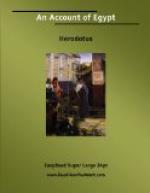As regards the nature of the river, neither from the priests nor yet from any other man was I able to obtain any knowledge: and I was desirous especially to learn from them about these matters, namely why the Nile comes down increasing in volume from the summer solstice onwards for a hundred days, and then, when it has reached the number of these days, turns and goes back, failing in its stream, so that through the whole winter season it continues to be low, and until the summer solstice returns. Of none of these things was I able to receive any account from the Egyptians, when I inquired of them what power the Nile has whereby it is of a nature opposite to that of all other rivers. And I made inquiry, desiring to know both this which I say and also why, unlike all other rivers, it does not give rise to any breezes blowing from it. However some of the Hellenes who desired to gain distinction for cleverness have given an account of this water in three different ways: two of these I do not think it worth while even to speak of except only to indicate their nature; of which the one says that the Etesian Winds are the cause that makes the river rise, by preventing the Nile from flowing out into the sea. But often the Etesian Winds fail and yet the Nile does the same work as it is wont to do; and moreover, if these were the cause, all the other rivers also which flow in a direction opposed to the Etesian Winds ought to have been affected in the same way as the Nile, and even more, in as much as they are smaller and present to them a feebler flow of streams: but there are many of these rivers in Syria and many also in Libya, and they are affected in no such manner as the Nile. The second way shows more ignorance than that which has been mentioned, and it is more marvellous to tell; for it says that the river produces these effects because it flows from the Ocean, and that the Ocean flows round the whole earth. The third of the ways is much the most specious, but nevertheless it is the most mistaken of all: for indeed this way has no more truth in it than the rest, alleging as it does that the Nile flows from melting snow; whereas it flows out of Libya through the midst of the Ethiopians, and so comes out into Egypt. How then should it flow from snow, when it flows from the hottest parts to those which are cooler? And indeed most of the facts are such as to convince a man (one at least who is capable of reasoning about such matters), that it is not at all likely that it flows from snow. The first and greatest evidence is afforded by the winds, which blow hot from these regions; the second is that the land is rainless always and without frost, whereas after snow has fallen rain must necessarily come within five days, so that if it snowed in those parts rain would fall there; the third evidence is afforded by the people dwelling there, who are of a black colour by reason of the burning heat. Moreover kites and swallows remain there through the year and do not leave the land; and cranes




